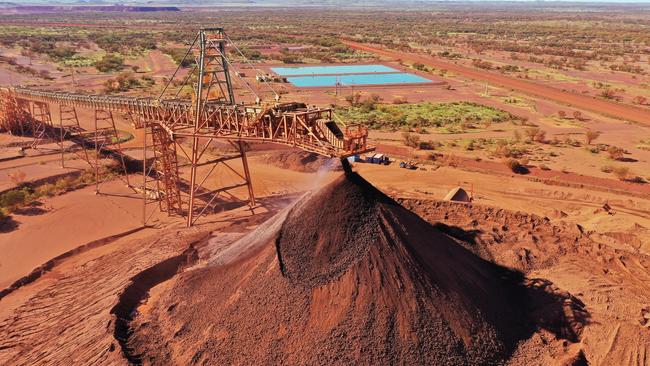Chinese single market threats could lead to ‘OPEC of iron ore’, says industry veteran
Chinese authorities appear to be serious about tilting the iron ore market in the favour of the country’s steel industry – but will it work?

Australian iron ore miners have taken another hit on the back of fresh speculation that Chinese authorities are preparing to intervene in iron ore markets, amid reports Beijing wants to establish a “centralised platform” to manage iron ore buying by its steel industry.
Bloomberg reported on Tuesday that China’s powerful National Development and Reform Commission is preparing a “single state-backed platform” to help stabilise the swings in the iron ore price, sparking falls on iron ore future markets and in the shares of Australian iron ore producers.
Iron ore futures traded on the Dalian exchange were down 2.2 per cent on Tuesday afternoon, with Singapore futures down 1.2 per cent to $US138.15.
While Australian stocks were also hit by escalating tensions in Ukraine, Rio closed down $1.70 to $118.50, BHP was off 43c to $47.81 and Fortescue Metals Group down 29c to $19.32.
It is unclear whether the NDRC is contemplating formal intervention in the market by trying to mandate a single buying point for spot cargoes, or even a return to the annual price setting negotiations that set iron ore prices until the system broke down in 2010.
Industry sources say the NDRC is more likely looking to establish its own price benchmarking system, and mandate the reporting of spot cargo sales – particularly those bought and then re-sold by trading houses, which have been blamed for steep price rises in mid-2021 and again more recently.
As part of the NDRC’s recent market crackdown Chinese media reports suggest regulators of the Dalian exchange recently identified seven incidents of market rule breaching by traders, including profiteering, and market manipulation such as agreeing on transaction values to affect the contract prices, and self-transactions to affect contract prices.
Only about 15 per cent of iron ore cargoes are sold into the spot market, but daily spot-market prices – gathered by third-party researchers such as S&P Global Platts – are used to help set the price of most long term contracts.
Chinese authorities have always complained about spot-market assessments compiled by independent market researchers, believing they favour iron ore producers.
But previous attempts by China’s steel industry and authorities to build its own benchmarking system have failed.
China launched its first physical iron ore trading platform in 2012, backed by China Iron & Steel Association (CISA) and major steelmakers and domestic trading houses, but the platform did not win support from major iron ore miners and gained little traction in the market.
Iron ore marketing veteran Philip Kirchlechner, who still acts as a consultant to many of Australia’s smaller producers, told The Australian any move by China to target Australian producers for political reasons would only hurt China.
“Australia has been a good partner for China. We’re stable and dependable, and Australia is the only jurisdiction that has been able to increase iron ore production to match Chinese demand,” he said.
“If Xi Jinping wants the iron ore price down, he needs to encourage people to increase production. Threatening the Australian government or threatening the Australian mining industry is not going to assist that. Chinese companies have a lot of projects here – they should develop these projects and increase production.”
RBC resources analyst Tyler Broda said a move to a centralised planning system for iron ore buying “would almost certainly reduce the efficiencies gained from market-driven systems”.
“But it would also reduce the amount of speculation, and therefore volatility, something which might help the iron ore producers in due course,” he said.
“In our view, centralisation and co-ordination would likely transfer value at the margin to China.”
Mr Kirchlechner said any Chinese moves to centralise pricing were unlikely to work, given China’s previous involvement in annual benchmarking negotiations had broken down on the unwillingness of Chinese steel mills to stick to paying agreed prices if they were able to find cheaper iron ore elsewhere in the market.
“Maybe China should revisit the benchmark system. But that requires someone to enforce the discipline to actually make it work,” he said.
He said a centralised buying system could potentially even lead to the establishment of an “OPEC of iron ore” cartel between major producers in Australia and Brazil.
“If there is an appearance of government interference in a market, or organised collusion on the buyer’s side, I would expect suppliers also to become organised,” he said.


To join the conversation, please log in. Don't have an account? Register
Join the conversation, you are commenting as Logout